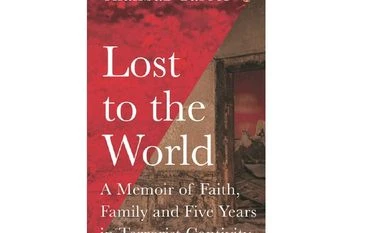Lost to the World: A Memoir of Faith, Family, and Five Years in Terrorist Captivity
Author: Shahbaz Taseer
Publisher: Penguin Viking
Pages: 274
Price: Rs 599
The horror of it hits you in the very first chapter. The stench leaps out of the pages. A mud-walled room with straw and animal faeces scattered on the dirt floor, and sprawled on it a man with his hands and feet bound with metal cuffs — beaten, bruised and drugged repeatedly with ketamine, a horse tranquiliser.
This is no ordinary kidnapping. The people who have snatched him while he was driving to his office from home in Lahore are members of the Islamic Movement of Uzbekistan (IMU), a terrorist organisation with links to al-Qaeda and the Taliban. After lying low in Lahore for a few days, they will take him to Pakistan’s Federally Administered Tribal Areas, a region that’s been on the radar as a hotbed of militancy for decades. Later, they will hand him over to the Taliban in Afghanistan. It is a miracle that he lived to tell the tale.
Lost to the World is his account of that nightmare, which lasted nearly five years, a period in which no one called him by his name: Shahbaz Taseer. His kidnappers instead gave him an alias, Ahmed, or they’d call him “Jee Bhai” (Yes, brother), a jibe since that’s how he would respond to nearly everything as a survival instinct.
Shahbaz Taseer’s was one of the most high-profile kidnappings in Pakistan. The audacious act was pulled off in a commercial, upscale neighbourhood of Lahore on August 26, 2011, barely seven months after his father, Salman Taseer, the governor of Pakistan’s Punjab province, was shot dead. The senior Taseer, a business tycoon with a media empire and a strong critic of Pakistan’s harsh blasphemy laws, was killed by his bodyguard, a religious fanatic, who pumped 27 bullets into him.
To understand what happened to this family in 2011, one needs to turn the clock back. Shahbaz Taseer does that, explaining, first, what the family was about: Modern, western educated, and highly successful. The senior Taseer was a go-getter, an ardent supporter of Zulfikar Ali Bhutto and openly critical of Zia-ul-Haq. His son writes of him as his hero, an upright man who wanted to see Pakistan as a forward-looking democracy — not something that was approved of by the clerics.
He writes of the Lahore he grew up in, vibrant and colourful; of his carefree teenage years spent listening to American bands such as Guns N’ Roses; of dreaming of going to college in the US… Until 9/11 happened and changed the world. Not only did it make people suspicious, fearful and angry, it also made them act on those emotions and feelings.
The life of privilege and the bubble he says he had been living in burst. A huge part of the world was suddenly inaccessible. The US was out, so he enrolled in SOAS University, London. But despite both his maternal and paternal grandmothers being British, he says for the first time he felt like an outsider.
In 2010, he and wife experienced first-hand the deep suspicion against Muslims who held a Pakistani passport when the FBI arrested them from a flight at San Francisco airport while they were on a holiday. There had been an anonymous bomb threat and they were promptly marked out. The ordeal ended only after he dropped his father’s name, and mentioned Senator John Kerry and US Secretary of State Hillary Clinton.
If the western world’s attitude towards Pakistan was changing, so was Pakistan’s neighbourhood. Shahbaz Taseer provides a quick overview of it to give the context to his story. The region had become increasingly complex and dangerous. The mujahideen, raised by the US and Pakistan together to take on the Soviets in Afghanistan, would return to haunt these countries. And a perfect storm was brewing in the form of al-Qaeda, the Taliban and the Islamic Movement of Uzbekistan. Shahbaz Taseer would find himself in the middle of it.
Lost to the World is a frightening account. Accompanying it are pictures of his torture. There is one with blade marks carved on his back. And another of him buried neck down — a punishment awarded for hours at a time for three days. And yet another of him being lashed — 100 times a day for almost a week. Along with these are pictures of his family: He and his mother smiling in one; his father celebrating an election victory; exploring the ruins of Ephesus in Turkey with his father and brother.
Hope appears alongside despair. The story of his captivity also veers between the two. In some pages you see him struggling not to lose his mind. In others, you find him resolving to meet whatever cruel fate awaits him with dignity. There is chilling barbarism, and some acts of kindness, like a guard sharing a radio so that he can tune into Manchester United games. Small things, he says, that helped preserve his sanity.
Not every hostage taken has returned to tell their story. A Mighty Heart, the last film Shahbaz Taseer watched before his kidnapping, was about one who did not make it: Daniel Pearl.













)


